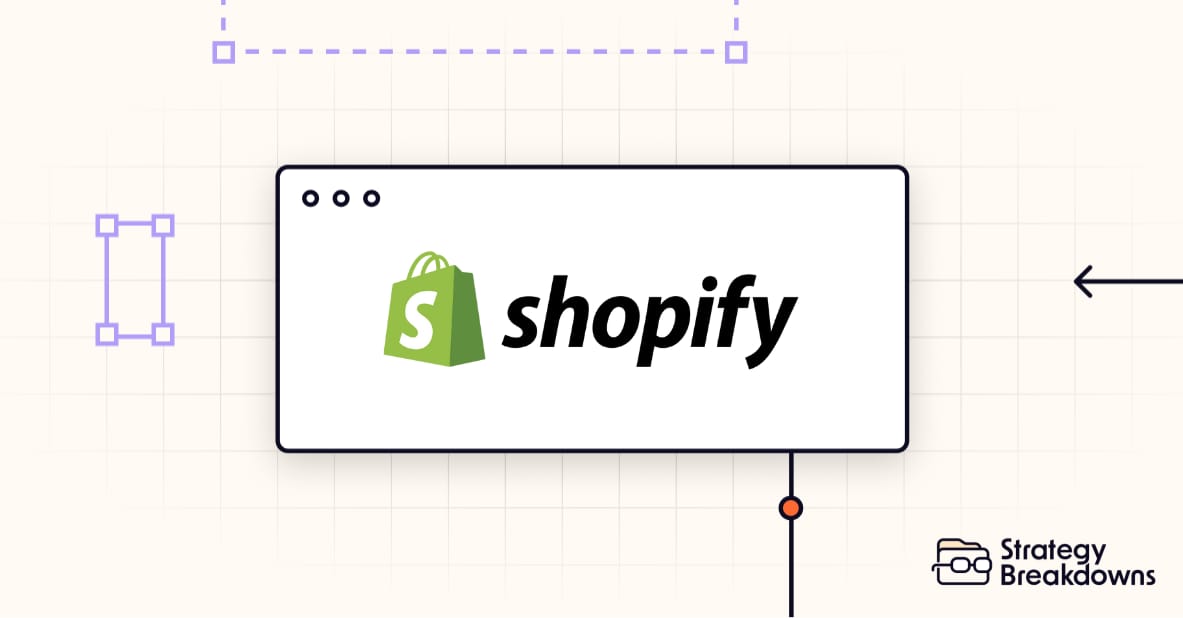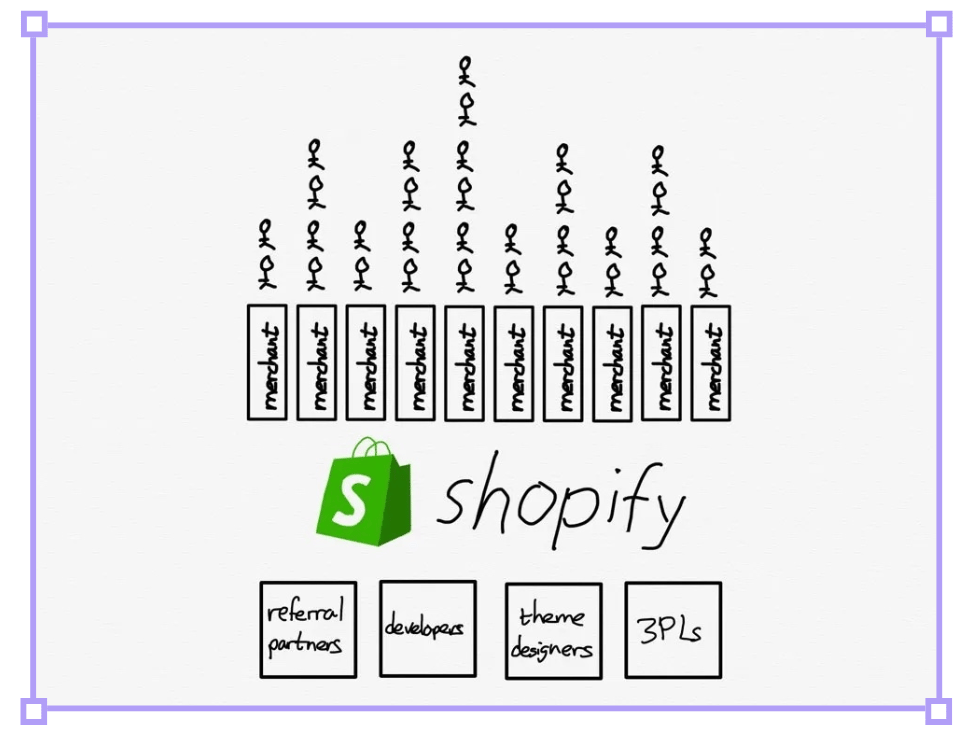Read time: 3 minutes

Welcome to the 1,682 strategy nerds who have joined us over the last 2 weeks!
Join the growing community of 15,021 readers getting byte-sized strategy playbooks here:
All done? Perfect - onto today’s breakdown…
Ever wondered how Shopify managed to grow their transaction volume to 50% the size of Amazon Marketplace?
When Shopify launched in 2006 it was called ‘Snowdevil’… and it was planned to be an online store for snowboarding equipment.
At the time, the founders had 2 options to launch their store:
Attempt to assemble a complex web of clunky tools that don’t work well together, or
Launch on Amazon Marketplace and helplessly wave goodbye to ~15% of revenue skimmed off their top line.
The solution? Pivot ‘Snowdevil’ into ‘Shopify’, and build the ultimate toolbox for independent online sellers.
Let’s dig into a strategy that enabled them to pull it off:
The Shopify App Store.


Become Leadership Material in 90 Days
Turn strategy skills into your career superpower with bite-sized, practical tutorials.
No theory, just actionable skills that instantly increase your workplace value.
“We need a front-end developer by Tuesday, but it’ll take months to find someone in the US”
We use Athyna at Strategy Breakdowns – and a bunch of our friends do too. If you are looking for your next remote hire, Athyna has you covered. From sales to marketing, ops to engineering.
The secret weapon for ambitious startups. No search fees. No activation fees. Just incredible talent, matched with AI-precision, at lightning speed.
Thank you for supporting our sponsors, who keep this newsletter free.



Chess Move
The what: A TLDR explanation of the strategy
Shopify's App Store provides merchants a comprehensive toolkit of specialised 3rd party integrations to build, run and improve their online stores.
By cultivating a rich ecosystem of developers building for every edge-case, Shopify transformed its platform into a one-stop-shop for all possible ecommerce needs (just like Apple and the iPhone).
Amazon won ecommerce by being the department store.
Shopify claimed its wedge by being how sellers build their own store.


Breakdown
The how: The strategic playbook boiled down to 3x key takeaways
1. Let others do the building:
Becoming an all-in-one toolbox is great in theory, until you consider the endless list of user needs you have to solve for.
So, Shopify welcomed third party developers into the tent, empowered them to monetise easily, and let them build countdown timers, recommendation engines, search boxes, and fulfilment integrations to their heart’s content.
Now, Shopify’s feature coverage is immense and dynamic:
Updated European compliance requirements? GDPR apps jump on it straight away.
New TikTok commerce features announced? Developers ship updates for sellers to take immediate advantage.
Takeaway: Can you provide the right incentives and ecosystem structure for third-parties to help make your offering more complete?
2. Be the glue:
Trying to integrate tools that don’t play together is like building a house with sticks and band-aids. Now imagine what it was like in 2006.
A part of what makes Shopify’s App Store so powerful is how seamless it is for merchants: Add an app, instantly start configuring, deploy new functionality to your store within minutes.
From email marketing to accounting software to shipping providers, the App Store lets merchants rapidly operationalise not just an online storefront, but an entire ecommerce business.
Takeaway: If you can do one thing really really well, maybe it should be making things seamless for your customers.
3. Become the competition’s biggest weakness:
For years, analysts debated who would beat Amazon at their own game.
Shopify took another approach -
Rather than compete head on, they built an App Store to become everything that Amazon wasn’t:
Centralised tool stack → Third-party app ecosystem
Lookalike product pages → Customisable storefronts
Singular merchant experience → Extensible backend
Takeaway: If you can’t beat ‘em, become what they can’t.
Shopify didn’t set out to become the ‘next Amazon’.
They made a bet that the ‘next Amazon’ was just… sellers themselves.


Rabbit Hole
The where: 3x high-signal resources to learn more
[7 minute read]
Stratechery hit a slam dunk on this write-up - read if you enjoy hand-drawn mental models and back-to-back “Oh wow” moments. Our favourite quote:
“𝘌𝘷𝘦𝘳𝘺 𝘳𝘦𝘧𝘦𝘳𝘳𝘢𝘭 𝘱𝘢𝘳𝘵𝘯𝘦𝘳, 𝘥𝘦𝘷𝘦𝘭𝘰𝘱𝘦𝘳, 𝘵𝘩𝘦𝘮𝘦 𝘥𝘦𝘴𝘪𝘨𝘯𝘦𝘳, 𝘢𝘯𝘥 𝘯𝘰𝘸 3𝘗𝘓 𝘱𝘳𝘰𝘷𝘪𝘥𝘦𝘳 𝘪𝘴 𝘴𝘪𝘮𝘶𝘭𝘵𝘢𝘯𝘦𝘰𝘶𝘴𝘭𝘺 𝘪𝘯𝘤𝘦𝘯𝘵𝘪𝘷𝘪𝘻𝘦𝘥 𝘵𝘰 𝘤𝘰𝘮𝘱𝘦𝘵𝘦 𝘸𝘪𝘵𝘩 𝘦𝘢𝘤𝘩 𝘰𝘵𝘩𝘦𝘳 𝘯𝘢𝘳𝘳𝘰𝘸𝘭𝘺 𝘢𝘯𝘥 𝘦𝘯𝘴𝘶𝘳𝘦 𝘵𝘩𝘢𝘵 𝘚𝘩𝘰𝘱𝘪𝘧𝘺 𝘴𝘶𝘤𝘤𝘦𝘦𝘥𝘴 𝘣𝘳𝘰𝘢𝘥𝘭𝘺, 𝘣𝘦𝘤𝘢𝘶𝘴𝘦 𝘵𝘩𝘢𝘵 𝘮𝘦𝘢𝘯𝘴 𝘵𝘩𝘦 𝘱𝘪𝘦 𝘪𝘴 𝘣𝘪𝘨𝘨𝘦𝘳 𝘧𝘰𝘳 𝘦𝘷𝘦𝘳𝘺𝘰𝘯𝘦.”
[5 minute read]
Step 1: Raise 8 figures
Step 2: Buy out Shopify app developers
Step 3: Create synergies, cross-sells, and efficiencies
Step 4: Repeat
Here’s a rundown of companies to know in this space.
[26 minute read]
Jaryd Hermann’s newsletter ‘How they Grow’ is practically required reading for us strategy nerds. Here’s his take on Shopify’s app store:
“𝘐𝘵 𝘮𝘢𝘴𝘴𝘪𝘷𝘦𝘭𝘺 𝘸𝘪𝘥𝘦𝘯𝘴 𝘵𝘩𝘦𝘪𝘳 𝘢𝘥𝘥𝘳𝘦𝘴𝘴𝘢𝘣𝘭𝘦 𝘤𝘶𝘴𝘵𝘰𝘮𝘦𝘳 𝘣𝘢𝘴𝘦, 𝘣𝘦𝘤𝘢𝘶𝘴𝘦 𝘯𝘰𝘸 𝘮𝘰𝘳𝘦 𝘵𝘺𝘱𝘦𝘴 𝘰𝘧 𝘱𝘦𝘰𝘱𝘭𝘦 𝘤𝘢𝘯 𝘶𝘴𝘦 𝘚𝘩𝘰𝘱𝘪𝘧𝘺 𝘧𝘰𝘳 𝘢𝘯𝘺𝘵𝘩𝘪𝘯𝘨, 𝘰𝘳 𝘢𝘥𝘥 𝘧𝘶𝘯𝘤𝘵𝘪𝘰𝘯𝘢𝘭𝘪𝘵𝘺, 𝘥𝘰 𝘴𝘶𝘣𝘴𝘤𝘳𝘪𝘱𝘵𝘪𝘰𝘯 𝘴𝘢𝘭𝘦𝘴, 𝘰𝘳 𝘥𝘰 𝘸𝘩𝘢𝘵𝘦𝘷𝘦𝘳 𝘸𝘪𝘵𝘩𝘰𝘶𝘵 𝘚𝘩𝘰𝘱𝘪𝘧𝘺 𝘤𝘭𝘶𝘵𝘵𝘦𝘳𝘪𝘯𝘨 𝘢𝘯𝘥 𝘮𝘶𝘥𝘥𝘺𝘪𝘯𝘨 𝘵𝘩𝘦 𝘮𝘦𝘴𝘴𝘢𝘨𝘪𝘯𝘨 𝘰𝘧 𝘵𝘩𝘦 𝘤𝘰𝘳𝘦 𝘱𝘳𝘰𝘥𝘶𝘤𝘵.”
That's all for today’s issue, folks! Optimise your feeds by following along on Twitter [@tomaldertweets] and LinkedIn [/in/tom-alder]
Got feedback? Any requests for the next breakdown?
Let us know by replying to this email!


Whenever you're ready, there are 3 ways we can help you:
Our flagship course on how to use free internet data to make better strategic decisions. Contains 5 years of strategy expertise, proven methods, and actionable tactics to accelerate your career with modern-day strategy skills.
We have a growing audience of 55,000+ strategists from top companies like Google, Meta, Atlassian, Stripe, and Netflix. Apply to feature your business in front of Strategy Breakdowns readers.
One of the most common questions we get asked is: “What tools do you use to run Strategy Breakdowns?” So, we’ve open-sourced our tech stack to give you an inside-look at exactly what tools we’re using to power each corner of this operation.






